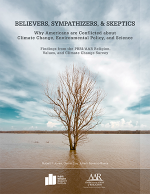
Attitudes toward evolution and the compatibility of science and religion were addressed in a new survey (PDF) from the Public Religion Research Institute (which, as NCSE previously reported, was mainly focused on climate change). Presented with "Evolution is the best explanation for the origins of human life on earth," 24% of respondents completely agreed, 29% mostly agreed, 14% mostly disagreed, and 27% completely disagreed, with 5% of respondents saying that they didn't know or refusing to answer. In 2007, 20% of respondents completely agreed, 28% mostly agreed, 16% mostly disagreed, and 29% completely disagreed, with 7% of respondents saying that they didn't know or refusing to answer.
Asked whether they think that science and religion are "often in conflict" or "mostly compatible," 54% of respondents chose conflict, with 40% choosing compatibility and 5% saying that they didn't know or refusing to answer. But asked whether science conflicts with their own religious beliefs, 38% of respondents said that it did, while 59% said that it did not and 3% said that they didn't know or refused to answer. In 2009, 55% chose conflict, with 38% choosing compatibility and 7% saying that they didn't know or refusing to answer; 36% said that science conflicts with their own religious beliefs, while 61% said that it did not and 3% said that they didn't know or refused to answer.
According to the survey report, "Results of the survey were based on bilingual (Spanish and English) RDD telephone interviews conducted between September 18, 2014, and October 8, 2014, by professional interviewers under the direction of SSRS. Interviews were conducted among a random sample of 3,022 adults 18 years of age or older living in the United States (1,502 respondents were interviewed on a cell phone). ... The margin of error for the survey is +/- 2.8 percentage points at the 95% level of confidence. The design effect for the survey is 2.4. In addition to sampling error, surveys may also be subject to error or bias due to question wording, context and order effects."
